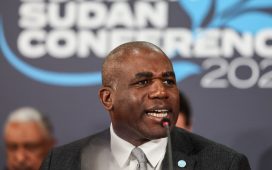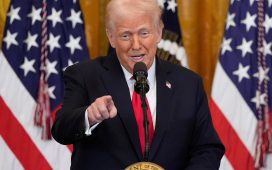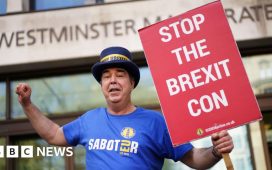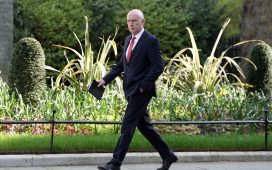Environment minister accuses Starmer of ‘flip-flopping’ over Brexit

Nicola Slawson
The Tories have accused Keir Starmer of flip-flopping over the EU following claims Labour wants to effectively undo Brexit.
The Labour leader made a speech on Thursday where he outlined his vision of a future UK relationship with the EU, saying Labour didn’t “want to diverge”.
The Labour leader was speaking at an event in Canada bringing together liberal and centre-left politicians, where he said that “most of the conflict” since Brexit had arisen because the UK “wants to diverge and do different things to the rest of our EU partners”.
Speaking on GB News on Friday morning, the environment minister, Mark Spencer, accused Labour of obsessing over Brexit and said Starmer seems to make policy up “on the hoof”.
He said:
We don’t really know what he’s saying, he’s flip-flopping about. One minute he’s saying he wants to have free movement, then the next minute is saying he wants to control our borders.
He doesn’t seem to have a clear policy and he seems to make it up on the hoof on occasion.
I think it’s very difficult to define what he just stand for. He seems to be, to me, obsessed in getting into power but doesn’t really have a principle to get in there – and I think that’s the real danger of the Labour Party.
Spencer added that we have got to acknowledge democracy happened and that the country voted to leave the EU.
He continued:
The prime minister is delivering that Brexit and now we are an independent country, separate from the EU, but we can still trade with them and still co-operate with them, but on our own terms.
I think that’s the right relationship, the right balance.
I think to keep obsessing – as the Labour Party do – over Brexit and looking back with pink-tinted spectacles and talking about following their rules, I think just takes us back in time.
We’ve got to get over the fact that we voted to leave the European Union, we need to embrace that, make the most of it – as we are doing – and stop looking backwards as the Labour Party appear to want to do.
I will be looking after the politics blog today. If you have any tips or suggestions, please get in touch: nicola.slawson@theguardian.com.
Key events

Artificial intelligence is developing too fast for regulators to keep up, the UK’s deputy prime minister is to announce as he aims to galvanise other countries to take the threat seriously in advance of the UK’s AI safety summit in November.
Oliver Dowden will use a speech at the UN general assembly on Friday to sound the alarm over the lack of regulation of AI, which he says is developing faster than many policymakers thought possible.
Dowden will urge other countries to come together to create an international regulatory system, something the UK is keen to promote when it hosts the summit at Bletchley Park.
According to comments released before the speech, Dowden will say:
The starting gun has been fired on a globally competitive race in which individual companies as well as countries will strive to push the boundaries as far and fast as possible.
In the past, leaders have responded to scientific and technological developments with retrospective regulation. But in this instance the necessary guardrails, regulation and governance must be developed in a parallel process with the technological progress. Yet, at the moment, global regulation is falling behind current advances.
Dowden’s comments reflect growing concern at the top of the British government over the possibility that cutting-edge technology could be used for harm.
Read the full story from my colleagues Kiran Stacey and Dan Milmo here:

Richard Adams
More than two-thirds of UK universities expected to take part in next week’s scheduled strikes called by the University and College Union (UCU) have now said they won’t take part.
UCU announced that 89 out of the 140 potentially taking industrial action will not now do so, while 10 campus branches will strike for at least one day out of the five scheduled.
However more than 40 are still striking for the full week, including Liverpool, Edinburgh and Newcastle universities.
Keir Starmer accused Rishi Sunak of creating uncertainty over suggestions he wants to introduce a British baccalaureate as part of a major overhaul of A-levels.
The Labour leader said:
This is speculation and, yet again, we’ve got the prime minister introducing uncertainty about what’s going to happen.
This is a characteristic of this government: uncertainty and no stability.
And I think many parents hearing this will be saying: look, at the moment we don’t have enough maths teachers in our secondary schools. At the moment many schools are closed or not functioning properly because the roofs might fall in.
So I think they’d say to the prime minister, concentrate on the day job, not on introducing uncertainty.

Diane Taylor
The Bibby Stockholm barge has had “satisfactory” test results for legionella, after tests initially found the presence of the potentially deadly bacteria, the Guardian has learned.
The Home Office, which hopes to hold hundreds of people seeking asylum on the barge in Portland, received the most recent legionella results on 4 September and government sources said they were not planning to make the results public. The Guardian obtained the results in freedom of information data from Dorset council.
In these most recent results, all the water samples tested for legionella were deemed “satisfactory”, although some of the bacteria were identified in two of the samples. In three previous sets of tests, at least some of the samples tested were found to be “unsatisfactory” for legionella.
The worst results related to samples from 9 August, two days after asylum seekers were briefly put on the barge. They were removed after just four and a half days. In these results, eight of the 11 samples taken were unsatisfactory and three were borderline. Some of the bacteria found was the deadliest strain, legionella pneumophila serogroup 1.
A second freedom of information request, to Cornwall council, revealed that the barge was not inspected for legionella while in Falmouth for checks and repairs before it was moved to Portland.
A third freedom of information request revealed that the Home Office has used water safety risk assessments for the Bibby Stockholm that are more than six years out of date. The Home Office said a more up-to-date risk assessment had subsequently been signed off.
Apart from the legionella bacteria found on the barge, concerns have been raised about planning, fire safety and plumbing breaches. Legal actions are under way relating to these issues.
A spokesperson for the Home Office barge contractor CTM confirmed that repairs to the plumbing were under way after an inspection by Wessex Water found failings.
Read the full story here:
Keir Starmer said it was “necessary” to legislate to force ministers to consult the Office for Budget Responsibility before major tax and spending changes.
The Labour leader told journalists at the London Stock Exchange:
It is necessary because a year ago the OBR offered to do an assessment of Liz Truss’s mini-budget and she turned it down.
We can’t let that happen again.
He said in the case of a “very significant event”, accommodations could be made so that changes could be introduced without forecasts.
The measure would bring the “stability that our economy desperately needs”, Starmer added.
Tory former chancellor George Osborne, who created the Office for Budget Responsibility, backed Labour’s plan and said Rishi Sunak should adopt it.
He said:
We created the OBR 13 years ago so chancellors couldn’t any longer fiddle the numbers.
A year ago we saw the fiasco when one tried to bypass it.
These OBR reforms from (Rachel) Reeves are sensible, pragmatic improvements. If the Tories are smart they’ll adopt them.
Keir Starmer defended his approach to dealing with the European Union after he was accused of flip-flopping over Brexit following a speech in Canada this week.
The comments he made during the speech – which Labour said were not a new statement of policy – came as Starmer outlined on a number of occasions last week how a future UK-EU relationship would look, opening him up to attack from the Tories and prompting surprise from some in his own party who had come to regard Brexit as dangerous territory.
Jeremy Hunt was quick to jump on the comments, saying they would worry people into thinking that “what he really wants to do is to unpick Brexit”. The environment minister Mark Spencer accused Labour of obsessing over Brexit and said Starmer seemed to make policy up “on the hoof”.
Starmer told reporters in the City of London there was “no case for rejoining the EU, no case for the customs union or single market” and laws would be “made in this country for the public interest”.
But Starmer added:
That does not mean that a Labour government would lower standards on food or lower the rights that people have at work.
That’s been consistent Labour party policy for years. Incidentally, that’s also government policy.
In response to the Labour plan to strengthen the Office for Budget Responsibility watchdog, the former prime minister Liz Truss said it beggared believe that the party would want to give even more powers to quangos.
The shadow chancellor, Rachel Reeves, announced plans that would mean ministers would have to consult the official watchdog on major tax and spending changes in order to prevent a repeat of Truss’s ill-fated mini-budget last autumn.
The move would ensure the Office for Budget Responsibility (OBR) was not “gagged” by future prime ministers and chancellors trying to avoid an official financial forecast.
Truss said:
The 25-year economic consensus has led to state spending being higher than it’s been for around 50 years, taxes at their highest since World War Two and a debt of over £2.5tn. This has caused low economic growth.
It beggars belief that Labour think Britain’s problems will be solved by bigger government and even more powers for quangos.
Hard-working people and businesses – freed from overbearing regulation, tax, and debt – are going to get Britain growing again, not more bureaucrats in London.
UK business activity shrinks most since financial crisis excluding Covid period

Julia Kollewe
The risks of a UK recession have risen as business activity is shrinking at the fastest pace since the financial crisis, when months hit by Covid-19 lockdowns are excluded, according to a closely-watched survey.
A steeper downturn in the dominant service sector is weighing on the UK economy, with overall business activity at a 32-month low in September, the ‘flash’ estimate from S&P Global showed.
You can follow our business liveblog here for more on that:

Ben Quinn
Ministers would have to consult the official watchdog on major tax and spending changes under Labour plans that would prevent a repeat of Liz Truss’s ill-fated mini-budget, the shadow chancellor, Rachel Reeves, has said.
The move would ensure the Office for Budget Responsibility (OBR) was not “gagged” by future prime ministers and chancellors trying to avoid an official financial forecast, she said.
A Labour government would also introduce legislation to ensure that the OBR has the power to independently publish its own impact assessment of any major fiscal event making permanent tax and spending changes, she pledged ahead of a visit on Friday to the London Stock Exchange with the party leader, Keir Starmer.
The plan was announced before the first anniversary of Truss and her chancellor Kwasi Kwarteng’s £45bn spree of unfunded tax cuts in a “mini-budget” that triggered a chain of economic chaos ranging from a sterling slump to soaring mortgage costs.
In a break with tradition, which further spooked international markets, Kwarteng refused to publish the OBR autumn 2022 forecast. When it was published 10 months later after a freedom of information request, it revealed he went ahead with a package of tax cuts despite being told by the OBR that the economy was on course for a year-long recession and that higher interest rates were pushing up the cost of servicing the UK’s debts.
“I’m saying that we won’t allow that to happen again because the OBR will not be gagged,” Reeves told BBC Radio 4’s Today programme on Friday.
The party said ministers would be forced to open their books to the forecasters, though any government wanting to disregard them could seek to reverse the legislation.
Reeves also defended plans to fix budget announcements for the autumn, followed by a spring update in early March, to give families and businesses time to prepare for changes.
Rejecting the assertion that it would make it harder for chancellors to respond to unpredictable events, she said: “This is good international practice, that you set a date for the budget and you stick with it.”
Read more here:
Rachel Reeves denied that Labour was “anti-motorist” because of its commitment to maintain the 2030 ban on petrol and diesel engines.
Rishi Sunak has pushed that deadline for new vehicles back to 2035, in a move criticised by car industry figures who wanted certainty on the shift to electric cars.
Sunak’s announcement that he will delay banning the sale of new petrol and diesel cars by five years to 2035 in a U-turn on the government’s climate commitments has triggered international condemnation and anger from industry.
The policy shift came on Wednesday, as the prime minister stated that there would also be a slowdown in the phasing out of gas boilers and that the requirement for landlords to make their properties energy efficient would be scrapped.
The shadow chancellor told BBC Radio 4’s Today programme that motorists who want an internal combustion engine beyond 2030 would still be able to buy second hand.
She said:
No one’s talking about banning petrol and diesel cars, the second-hand market will still be really vibrant and petrol and diesel cars will still be on the road for many years to come.
She added that Labour were “certainly not anti-motorists”.
The price of electric vehicles is coming down all the time. But over the last 24-48 hours, I’ve had so many messages from business leaders saying ‘all we want is a bit of stability and consistency and frankly some ambition from this government’.
We want businesses to invest in the UK, in the industries of the future from electric vehicles to carbon capture to green steel.
And they’ll only do that if we’ve got a government that is committed to these goals and these targets.
Shadow chancellor Rachel Reeves defended Keir Starmer’s position of not diverging from European Union standards on workers’ rights, environmental protections or food.
She said this will mean it will be easier for an incoming Labour government to get a better deal with the EU in order to improve trade.
She told BBC Radio 4’s Today:
It shouldn’t come as a surprise to people that an incoming Labour government doesn’t want to dilute workers’ rights, environmental protections or food standards. That’s not what Labour are about.
But because we want those high standards, we think it is easier for an incoming Labour government to get a better deal with the EU to improve trading relations.
Because the truth is, the deal that Boris Johnson secured three years ago is not good enough and we have seen a decline in trade between the UK and other European neighbours.
But she insisted there would not be “dynamic alignment”, where the UK follows changes from Brussels, and “we are not going to be rule-takers”.

Lisa O’Carroll
The Brexit trade deal should not be reopened just to satisfy demands from some sectors of the UK and EU motor industry concerned about looming tariffs on electric cars, Thierry Breton, the influential European commissioner, has said.
EU leaders have come under pressure to suspend 10% tariffs on electric car exports that are expected to begin in January under the Brexit treaty.
But Breton, who is responsible for the EU internal market and was speaking exclusively to the Guardian, said the commission and EU leaders are bound under competition laws to look at the entire automotive “ecosystem” and not favour one “category” in the industry over the other.
He believes the trade deal should not be unpicked.
“If something has been negotiated, it shouldn’t be changed,” Breton said.
Earlier this year Stellantis, the parent company for 14 brands including Vauxhall and Jeep, issued a stark warning that it may have to close operations in Britain with the loss of thousands of jobs if the tariffs were not temporarily lifted.
Their call has been backed by the European Automobile Manufacturers’ Association (ACEA), which has said exports of electric cars to the UK worth tens of billions of euros a year will be put at risk unless the Brexit trade deal is altered.
Recent support from Germany has fuelled anticipation of a favourable decision by the commission.
But Breton warned that the car industry was not made up of big brands like BMW, Volkswagen or Vauxhall alone and he had to ensure a level playing field for all.
Read the full story here:
Labour frontbencher James Murray suggested closer co-operation with Brussels would improve national security and increase trade.
The shadow Treasury financial secretary said comments from Conservatives following Starmer’s speech seem to be “an attempt to distract from the fact that they have no plan to make Brexit work.”
He told GB News:
I think this is about doing what is in our national interest – what’s in our national economic interest, as well as our other national interests when it comes to security, supply chains, cross-border policing and so on.
And actually, I think when I hear some of the Conservatives speaking about about what Keir Starmer said, it does feel to me like an attempt to distract from the fact that they have no plan to make Brexit work.
We know that businesses are suffering from greater red tape. We know this is impacting on growth. We know it’s deepening the cost of living crisis.
That’s why we want to see an improved trading relationship with the EU and to help grow the economy and make people across Britain better off.
Labour frontbencher James Murray has also been doing the media rounds to defend Keir Starmer following the Labour leader’s speech in Canada where he talked about the future relationship between the UK and the EU.
Murray insisted Starmer had been clear about the party’s “red lines” with the European Union.
He told Sky News:
Keir has been clear throughout that we have red lines when it comes to our relationship with the EU post-Brexit.
We don’t want to be in the single market. We don’t want to be in a customs union. We don’t want to bring back freedom of movement.
But we do want a better trading relationship, we want a better trade and investment relationship between the UK and the EU and I think what’s really clear is that the Tories have no plan to make Brexit work, and that is impacting on businesses and our economy and fundamentally leaving people across Britain worse off.
The shadow financial secretary said there would still be areas where a Labour government would diverge from Brussels, for example by striking trade deals around the world.
He added:
All we’re seeing under the Conservatives is extra red tape on businesses, which means that it’s impacting on economic growth, which means it’s deepening the cost of living crisis.
Shadow chancellor: Labour ‘doesn’t want to rejoin the EU’
The shadow chancellor, Rachel Reeves, dismissed claims Labour wanted to effectively undo Brexit.
Reeves said what Labour want is “a better relationship with our nearest neighbours and trading partners”.
She told BBC Radio 4’s Today programme:
We don’t want to rejoin the EU in name or any other way; we accept the result of the referendum.
That was seven years ago, more than seven years ago now. Times have moved on.
But we do want to have a better relationship with our nearest neighbours and trading partners.
Even Rishi Sunak has accepted that is possible, by re-entering the Horizon research programme between UK universities and European universities.
But there are other areas – for example making it easier to trade agricultural goods or helping our services sector with a mutual recognition of professional qualifications, helping our fantastic cultural industries tour round Europe.
Environment minister accuses Starmer of ‘flip-flopping’ over Brexit

Nicola Slawson
The Tories have accused Keir Starmer of flip-flopping over the EU following claims Labour wants to effectively undo Brexit.
The Labour leader made a speech on Thursday where he outlined his vision of a future UK relationship with the EU, saying Labour didn’t “want to diverge”.
The Labour leader was speaking at an event in Canada bringing together liberal and centre-left politicians, where he said that “most of the conflict” since Brexit had arisen because the UK “wants to diverge and do different things to the rest of our EU partners”.
Speaking on GB News on Friday morning, the environment minister, Mark Spencer, accused Labour of obsessing over Brexit and said Starmer seems to make policy up “on the hoof”.
He said:
We don’t really know what he’s saying, he’s flip-flopping about. One minute he’s saying he wants to have free movement, then the next minute is saying he wants to control our borders.
He doesn’t seem to have a clear policy and he seems to make it up on the hoof on occasion.
I think it’s very difficult to define what he just stand for. He seems to be, to me, obsessed in getting into power but doesn’t really have a principle to get in there – and I think that’s the real danger of the Labour Party.
Spencer added that we have got to acknowledge democracy happened and that the country voted to leave the EU.
He continued:
The prime minister is delivering that Brexit and now we are an independent country, separate from the EU, but we can still trade with them and still co-operate with them, but on our own terms.
I think that’s the right relationship, the right balance.
I think to keep obsessing – as the Labour Party do – over Brexit and looking back with pink-tinted spectacles and talking about following their rules, I think just takes us back in time.
We’ve got to get over the fact that we voted to leave the European Union, we need to embrace that, make the most of it – as we are doing – and stop looking backwards as the Labour Party appear to want to do.
I will be looking after the politics blog today. If you have any tips or suggestions, please get in touch: nicola.slawson@theguardian.com.











